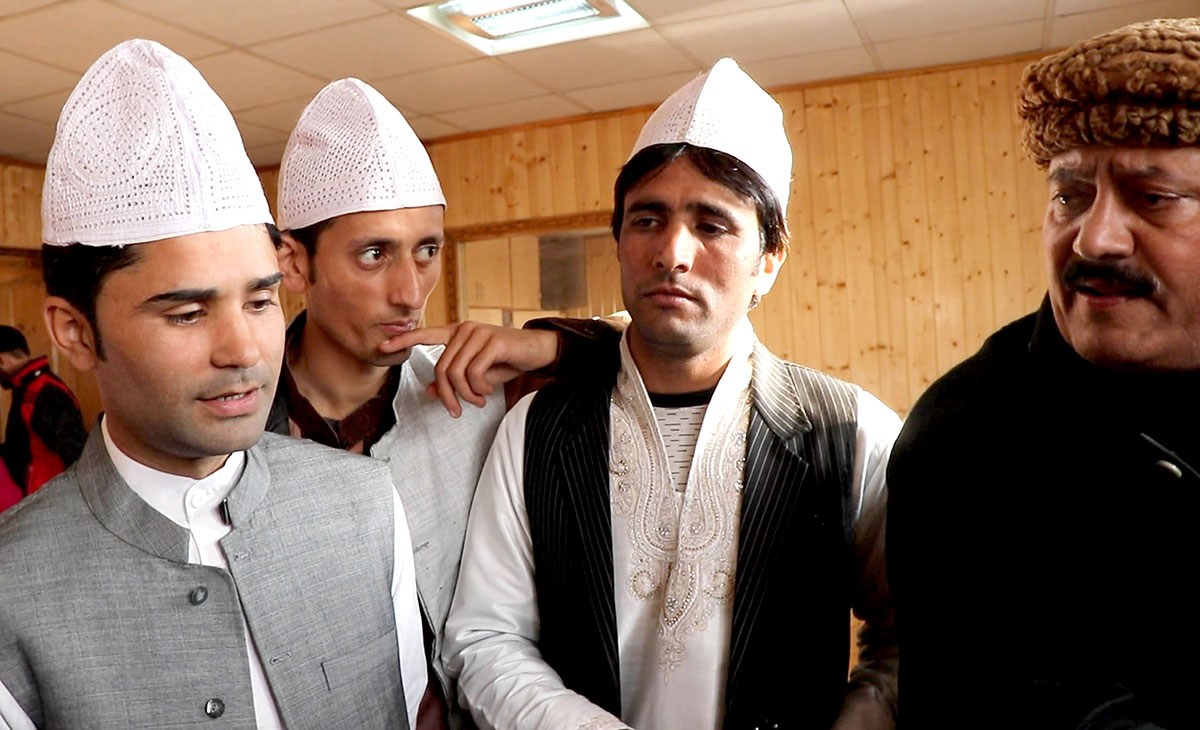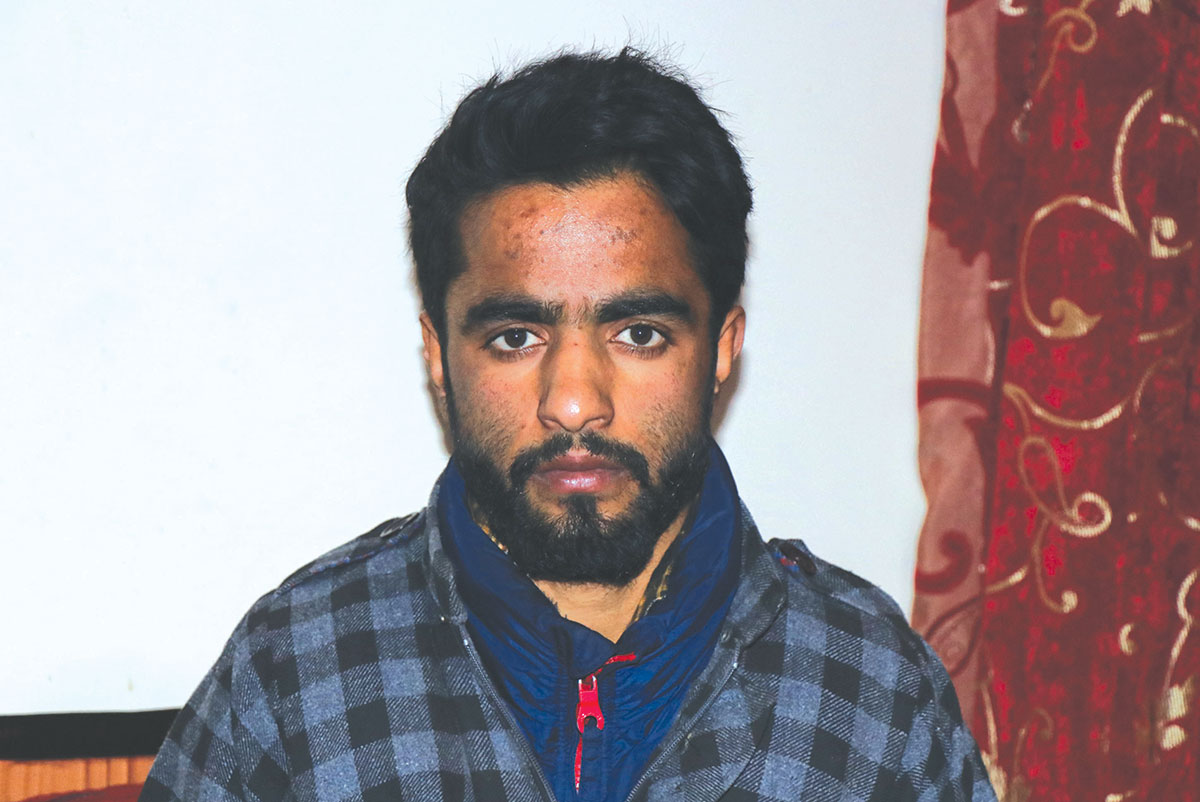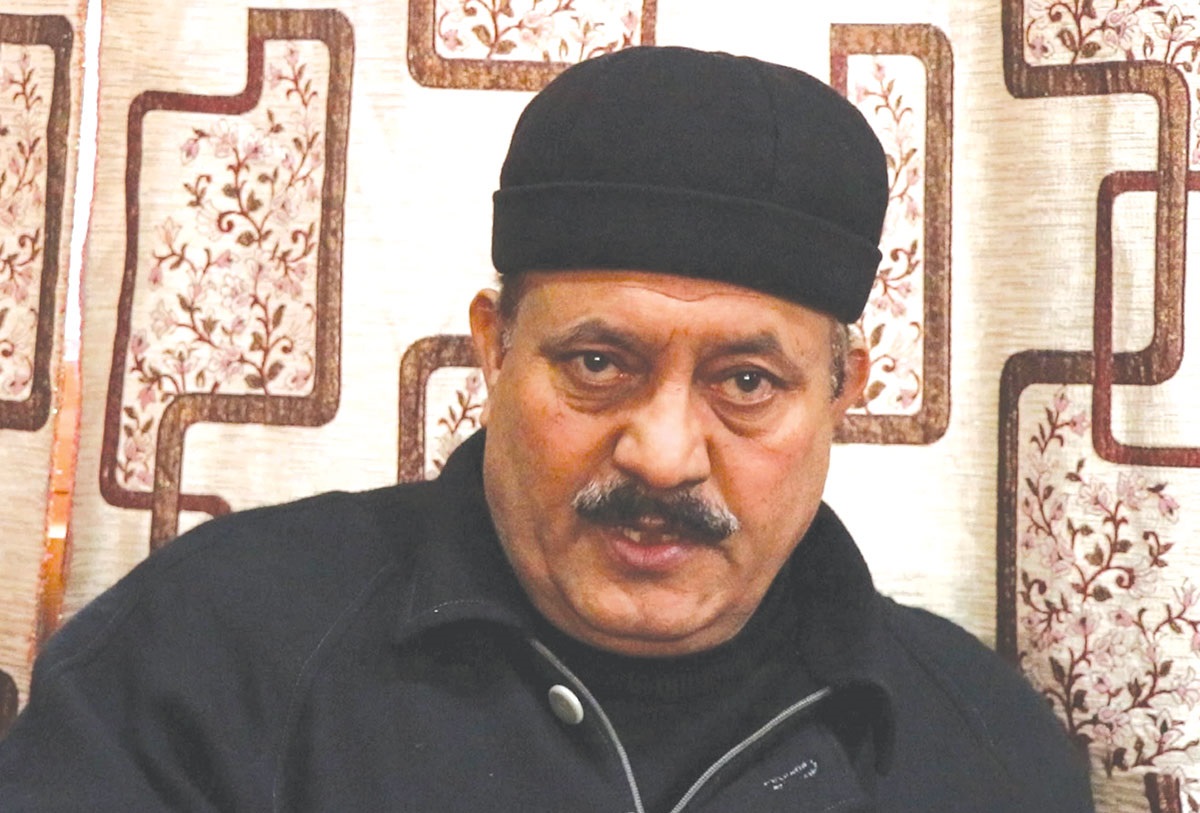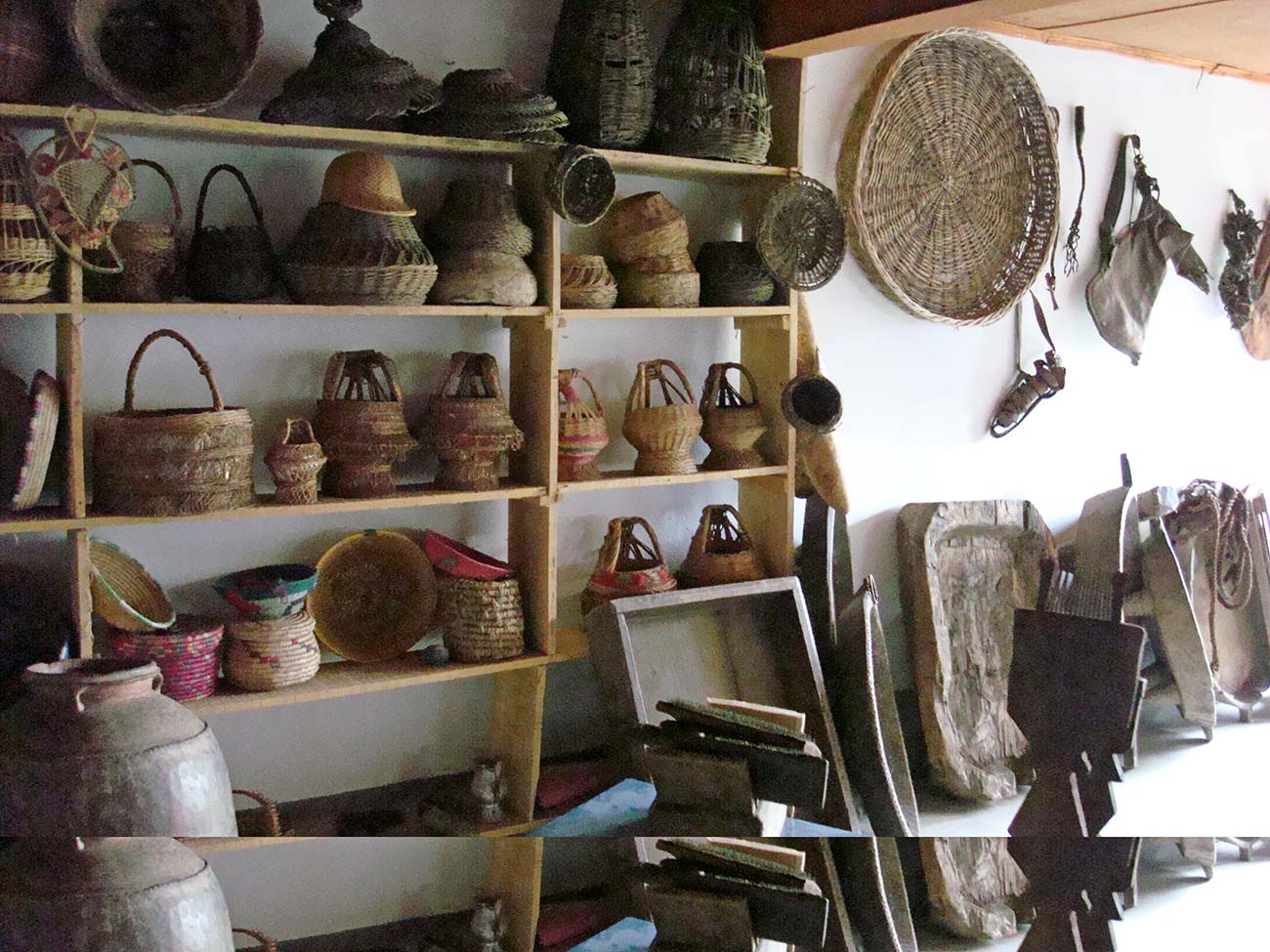For the last thirty years when the gloom and gore enforced mourning’s as the new priority, the Kashmiri song chose one of the most violent belts for survival. Shams Irfan meets the new generation of professional singers from Sonawari belt who have made the art as their profession and the experiment has been an astounding success

In 1990, when Abdul Rashid Yatoo became the proud father of the third son, the excited folk singer instantly decided to pass on his legacy to one of his sons. A resident of impoverished Sodnari village in Bandipora’s Sonawari belt, Yatoo earned his living by singing in private functions and sufiana mehfils (sort of religious gatherings). As Yatoo became popular in the belt, people started recognising him as Rashid Sodnari, a title he would pass on to his youngest son Mohammad Aslam Yatoo, along with his musical legacy.
“My father was keen that at least one of his sons should learn singing,” said Aslam. “He finally chose me.”
Aslam, now 28, started his musical journey in his teens by learning Kashmiri folk music from his father. “My first teacher was my father who is a known face in Kashmiri folk,” said Aslam. “After learning folk I went on to learn light Kashmiri music that includes Ghazals.”
Once in the cultural circuit, Aslam started understanding the market gradually. Soon, he realised that people are keen to get back to their roots and explore Kashmiri sufi folk, in a new way, slightly evolved, slightly modern. This renewed love for local folk among a new generation of Kashmiris made young singers like Aslam see hope and future in their passion, they were so keen to make a profession. “I quickly started learning Kashmiri folk as well,” said Aslam.
In 2006, Aslam joined the state-run Institute of Music and Fine Arts, Rajbagh in Srinagar to formally start his journey as a singer. “In the meantime, I also learned to play the harmonium.”
Two years later Aslam formed his own ensemble, comprising local artists who could play Sarangi, Rabab, Tumbaknari and Nout. The formation of a musical group is prerequisite for a singer to get formally affiliated with Radio Kashmir, one of two official platforms available for young singers like Aslam. The other is Doordarshan.
After Aslam’s ensemble passed the mandatory audition, he was empanelled as a B category singer. The Radio Kashmir grading is valid in Doordarshan Srinagar, as well. “But one cannot survive on Radio programmes only,” said Aslam.
Since 2008, Aslam has recorded just a song for Doordarshan, which earned his group just Rs 4500. Since it cannot be a source for survival, Aslam’s group performs at private gatherings, mostly religious. “We charge up to Rs 25,000 per night for a performance,” said Aslam.
These private performances help Aslam and his group survive financially, as during peak season: between April and December, they are booked for at least 20 nights, a month. However, during the harsh winter months of January, February and March, the number of performances gets reduced to just 10, a month.
But Aslam’s ensemble is not alone that is in demand for private parties, Sufiana mehfils, and marriage ceremonies. Sonawari belt is home to various other ensembles, who keep people entertained and hooked to Kashmiri music throughout the year.
Like Aslam, Suhail Fayaz Malla, 20, too is born into a family where Kashmiri Sufi music was played even at peak militancy in the 1990s. Suhail’s father Fayaz Ahmad Malla, a resident of Shilwat village, is still a sought after Kashmiri folk singer in the area. “My father is an A-grade Radio Kashmir and Doordarshan approved singer,” said Suhail with a hint of pride in his voice.
In sync with his family’s tradition Suhail formed his group in 2015, and after clearing the audition, he got enlisted with Radio Kashmir and Doordarshan as B-grade singer. “No doubt Radio and Television helps young singers like me to get recognition. But given the huge number of enlisted singers, we have to wait endlessly to get a single programme,” said Suhail. In last one year, Suhail recorded only one song. The abundance of artists and lack of work at Radio Kashmir and Doordarshan notwithstanding, young artists like Aslam and Suhail focus their energies to make it to the coveted A-grade. “Doing a show on radio is izzat (honour) for an artist,” insists Suhail. “You won’t believe, but despite new age technologies like the internet and television, radio has not lost its touch with the listeners. It (radio) still has its dedicated audience.”
These artists, however, do not sit idle and dream about getting a major break at Radio Kashmir. Instead, they hone their talent by attending private functions. “Without private mehfils (functions) we will die of hunger,” said Suhail in a matter of fact manner. “It also helps us to get recognized among music-loving circles.”
INSPIRATION
All these ensembles of Sonawari are the outcome of one successful model. It was the success story of a small neighbouring village boy Gulzar Ahmad Ganie, now 58, that inspired the younger generations of singers and artists from this belt that had acquired a different introduction during the turmoil. A resident of Mirgund (Pattan), Gulzar is one of the established and popular singers of Kashmir who has performed in more than 18 countries, so far.
Gulzar’s journey as a singer started at a very young age of ten when he was a student at a local government primary school. “During those days we used to have student meetings on Fridays,” recalls Gulzar. “In those meetings boys were asked to sing, act, dance and participate in a lot of cultural activities. It was kind of weekly talent hunt at a very local level.”
This “Friday meeting”, as it was known, was so famous that entire village would assemble outside school ground and watch students perform. “It was the only source of entertainment for people living in this area,” remembers Gulzar. Those weekly meetings were helping the boys and girls understand organising events, creating a set of competitions within the peers and helping hone the skills in different areas of cultural and economic activities. Singing, theatre, essay competitions, oratory apart, these weekly meeting would also have a segment about handicrafts. The products that the boys and girls would produce as part of these competitions would remain on display on the school walls thus creating models at the micro-level.
During one such Friday meeting, Gulzar’s teacher asked students to sing one of the couplets from famous Sufi poet Mohammad Sidiq Bhat, who is famous as Shams Fakir. “Our teacher wanted to check our voices, it was a sort of open-air audition,” recalls Gulzar. “When I sang those lines, everyone was impressed by the quality of my voice.”
That day onwards Gulzar was asked to lead morning prayers in the school, where he would sing religious prayers lyrically. Usually, boys and girls with better vocal cords and quality of voice would lead the praying songs in morning assemblies. Then, there were no public address systems available to schools.

When Gulzar’s father Sanaullah Ganie, who worked in the sericulture department, came to know about his son’s talent, he immediately made up his mind to make him a professional singer. “He was himself a singer in his youth but left it after he started working,” said Gulzar. “So, he wanted me to pursue it professionally.”
But Gulzar’s mother, a housewife, was against the idea that her son would choose singing over studies.
Two years later, when Gulzar left his primary school and got enrolled in a sixth class in the state-run High School at Narbal, he took his talent and fame along. “Teachers and students at Narbal by now knew me for my sweet voice,” recalls Gulzar with a smile.
Fortunately for Gulzar, when he shifted to Narbal from Mirgund; a teacher, who used to be part of “Friday meetings” too was transferred to the same school. The two were the team.
A few days after his arrival, the new teacher introduced the concept of Friday meeting in Narbal. “For next few years my skills as a singer were honed during these Friday meetings at Narbal,” recalls Gulzar. “The High Schools have more enrolment as these would cater to larger belts and that added to the word of mouth about me.”
At the age of 13, one day Gulzar’s father took him along on a cycle to attend a marriage function in a nearby village. At Narbal, Gulzar’s father stopped outside known folk singer Mohammad Abdulla Ganie’s house. “He took me inside and introduced me to Ganie,” recalls Gulzar. “Then he told him to take me along and teach me the art of singing.”
Excited, Gulzar went along with Ganie and his team to Beerwah village in Budgam, where he was scheduled to perform that night. After good wazwaan feast, while Ganie and his team were fixing their instrument to sing in front of their audience, Gulzar took a corner and fell asleep.
“At 2 am, I was woken by someone and to my surprise, I was in the room full of people,” recalls Gulzar. “Those moments were embarrassing but beautiful.”
Then the host of the function, the house owner asked Ganie to ask Gulzar sing something. “I was nervous initially but Ganie told me to sing whatever I like,” said Gulzar. “I sang Samad Mir’s poetry and everybody liked it.”
Impressed by Gulzar’s voice and his style of singing the crowd asked him to sing repeatedly at least four times. “This is how my journey as a singer started, formally,” recalls Gulzar.
That night cemented Gulzar’s place in Ganie’s group for the next eight years. “I even went to Radio Kashmir as part of Ganie’s group,” recalls Gulzar.
After leaving Ganie’s group Gulzar joined Abdul Rahim Bhat, another local singer, from Nadihal, Baramulla. “I spent three years with him,” said Gulzar. “Then I formed my own group.”
In between musical mehfils and programmes at the Radio Kashmir, Gulzar would attend school too. But given the stress of staying awake during these mehfils, Gulzar quit his studies in the tenth standard. In his free time, he would listen to famous singers on the radio. “I learned a lot from them. Then, Radio was the sole medium to listen to music and to me it was sort of a virtual teacher,” recalls Gulzar.
After that first night in Beerwah, Gulzar has been part of hundreds of such mehfils, but one particular night stays close to him always. “It was in 1983. I was with Abdul Rahim Bhat at Batmaloo Sahib’s shrine,” recalls Gulzar.
Originally born as Ghulam Mohammad Ganie, it was during that mehfil, he was first called Gulzar by one of Batmaloo Sahib’s decedents. “That day onwards I am known by this name only,” said Gulzar. The next year when he went to Radio Kashmir with his own group, he registered himself as Gulzar instead of Ghulam Mohammad Ganie.
Within no time Radio helped Gulzar become a household name. “I was really happy with the way people started to respond to my talent,” recalls Gulzar.
But in the 1990s, all of a sudden the sound of rabab, sarangi and tumbaknaris fell silent as guns started to roar across Kashmir. “It was a very difficult period for us as singers,” recalls Gulzar. “There were civilian killings and funerals every single day across Kashmir. Amid all the bloodshed we used to attend whatever few mehfils we could get.”
There was an objection to these gatherings from people, given the widespread bloodshed in almost every part of Kashmir. The society was not in a position to listen to music in an atmosphere of gloom as mournings were a new routine everywhere. Even the marriages became almost a quiet affair. “But we kept singing as it was our livelihood. How else were we supposed to feed our families?” asks Gulzar.
In 1992, Gulzar formed Kashmir Gulukar Society (KGS), under which a number of singers and artists from across Kashmir, joined hands. The purpose of KGS was to keep Kashmiri folk music alive and help local talent reach to the masses.
“KGS started celebrating anniversaries of famous Sufi saints at their shrines across Kashmir,” Gulzar said. “The exercise helped us to stay connected with the art and the masses.”
In 2014 Gulzar was given state award for his contribution to Kashmiri music and in 2016, he was bestowed the President’s Award.
“I have performed in almost every single Islamic country and taken Kashmiri folk music to different corners of the world,” said Gulzar proudly. “My success gives hope to young boys to keep on chasing their dreams.”He, however, does not remember the countries he visited and looks for his passport.
Apart from the hope that Gulzar’s success gives these young artists; his popularity has helped young singers like Aslam and Suhail get work beyond Kashmir boundaries. “Most of these offers come from Kashmiris who are settled outside Kashmir,” said Gulzar. “They are the ones who really appreciate both Kashmiri music and musicians.”
CONNECTING TO ROOTS
A few years back, while scouting for bach-kourt, a Kashmiri dancer, a male who dances with long colourful attire, for accompanying him to functions in Srinagar, Gulzar came in touch with Aslam. Since then Aslam is performing with Gulzar whenever the need arises. “Though I have my own group now I still go to private functions with Gulzar Sahab,” said Aslam. “It helps a young singer like me to get introduced to music-loving circles in and outside Kashmir.”
Since their first meeting with Gulzar, second generation young singers like Aslam, Suhail and a few others, have frequently performed with him at marriage functions, private parties, Sufiana mehfils, and at shrines. “We act as his back-up crew or singers whenever he needs us,” said Suhail.
In turn, Gulzar’s popularity and connections help these young singers get offers from outside Kashmir as well.
“Almost every winter, I am invited by Kashmiris residing in different Indian cities for performance,” said Aslam. “In last few years, I have performed in Chandigarh, Delhi, Diu, Daman and many other places.”
Interestingly, most of the families who book these singers during winters are Kashmiri Pandits (KPs), who live in different cities across India, post-migration. “These people (KPs) are more connected with their roots than us,” said Aslam. “They treat a singer or an artist like a celebrity. But ironically, back home, nobody gives a damn if we live or die.”
Among his many performances outside Kashmir, Aslam recalls his visits to Bangalore, where he is regular to a particular KP family’s all marriages. “I have already performed at two marriages in their family. They now treat me like their own son,” said Aslam with a smile on his face. “They (KPs) understand the cultural importance of Sufi folk and that is why they want to keep it alive for their future generations,” said Aslam. “Else why would anyone call singers from Kashmir to Bangalore, just to listen to Kashmiri folk?”
On both marriages, Aslam was booked for over a week along with his six team members in Bangalore. “Money we can earn here too, but they really make you feel special. What else does an artist need?” asks Aslam.
Aslam is not the only busy singer during winters who performs outside Kashmir.
Adil Manzoor Shah, 22, a resident of Singhpora, Pattan, who started his career by playing instruments like nout, tumbaknari and rabab, and then moved on to became a lead singer, is already booked for the winters. Like other singers of his age, Adil too belongs to a family of musicians and singers. Adil’s father Manzoor Ahmad Shah, 50, is an A-plus category singer at Radio Kashmir, who has over five hundred CD’s and cassettes to his name, in his thirty years of career.
In 2008, after quitting his studies in the eighth standard, Adil followed his father’s footsteps and started playing traditional musical instruments, as a team member of his father’s group.
“My father is a known singer so it was natural to get influenced by music,” said Adil.
But after spending five years in his father’s shadow as a musician, Adil finally formed his own group in 2013 and became its lead singer. “Though I am listed with Radio and Television, as there were no fresh auditions since 2013, I do programmes for the cultural academy,” said Adil.
But Adil’s real exposure as a singer came while travelling to different parts of India during winters with his father. “I used to accompany him as a musician to different cities, which gave me much needed confidence and exposure,” said Adil.
Since 2013, Adil has performed outside Kashmir with his group over fifty times. Besides he accompanies his father whenever the need arises. As a solo singer Adil has travelled to Allahabad, Bombay, Delhi, Jaipur, and Jammu with his group and performed at private parties and functions. “Almost ninety per cent of these private functions are organized by Kashmiri Pandits. They are the ones who are keeping our music alive,” feels Adil. “Outside Kashmir we only sing traditional Kashmiri Sufi poetry, which KP’s like and appreciate the most.”

Adil and his group of six musicians charge Rs 60,000 for a night’s performance in Jammu. If the performance is in Delhi then the charges are more than one lakh rupees. “We have to manage travel on our own while accommodation is managed by the host,” said Adil.
The demand for singers among Kashmiris who live outside the valley has increased over the last two decades. “They don’t like ghazals or new songs. These people want to stay connected with their roots through music,” feels Gulzar.
That is why every young singer like Aslam, Suhail and Adil, who could sing old Sufiana Kashmiri folk are in demand outside the valley. “We get so many requests for performances that I and my father rent a room in Jammu during winters,” said Adil. “From Jammu, we travel to the rest of India during winters. From Jammu, it is easy to do so.”
Last year Adil was given Seshrang Award-2018, for being the promising folk singer of Kashmir. Adil has over 250 recordings to his credit, so far. “These video CD’s help us connect with our audiences. Besides, our songs are now available on Youtube as well. This helps an artist to reach out to people outside Kashmir easily now.”















